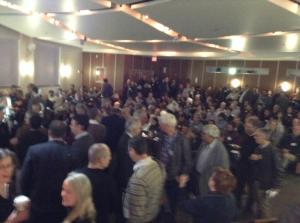UC Berkeley BIDS Launch and Conscilience
Yesterday I attended the launch of the University of California Berkeley Institute for Data Science (BIDS). The Moore and Sloan Foundations announced a 5 year, $37.8 million contribution to kick start this Institute, which will be the third of its kind in the country. The other two are at the University of Washington and NYU. The Institute will open physically in 2014, with a pretty nice real estate inside the Doe Memorial Library.
I am pretty enthusiastic to have this Institute so close to home. There will be great opportunities to attend events and take advantage of whatever resources are made available to the community at large (I’m not a student at Cal). More than that, I would be interested in contributing my own time, or enabling a collaboration with The Data Guild, in whatever way possible, to advance the local data science community through UC Berkeley.

Packed house at the BIDS launch event
The launch event consisted of talks and presentations by many of the people involved, including Cal Chancellor Nicholas Dirks, the director of BIDS (and Nobel laureate) Saul Perlmutter, Tim O’Reilly, and Peter Norvig of Google fame. There were also interesting talks about academic data science projects currently in progress at the University.
A key idea, one that seemed to form a common thread across all the talks, was that of conscilience. The term was popularized by EO Wilson in 1998 in his eponymous book, in which he talks about disciplines — the hard sciences, the social sciences, and the humanities — moving closer to each other. Part observation and part projection, Wilson pointed out that part of this bridging between disciplines would be due to advances in technology and computation.
In the data science context, this shrinking of gaps between previously distinct communities and cultures is often observed between the scientific/academic and the commercial/industrial communities, two groups which historically have had very different objectives and approaches. We have seen in recent years that this is changing rapidly. Joshua Bloom noted in the panel discussion at the end of the evening that they are still quite separate, and likely will always be separate, but that they are undeniably much closer together than they have been in the past.
The talks at the BIDS launch event went beyond this common observation, though. Several mentioned the meeting of the hard sciences with social sciences, and the inter-disciplinary collaborations through data science. They talked about in the benefit of learning to think about problems in new, more data-centric ways, and how such data-driven approach was methodologically-centered rather than domain-specific. They specifically described how this shift towards methodology would create new types of specialists that could operate successfully across many disciplines. They even described a shift in cultures, harkening directly back to EO Wilson, and back to CP Snow’s “Two Cultures” argument.
Wonderful, and appropriate, that the launch of a new institute of data science should bring together so many bright persons from a broad array of backgrounds, and create an opportunity for these philosophical reflections. These next few decades are going to be a very exciting time, when we get to observe and be part of the contribution that data science is making to the unity of knowledge.
One comment